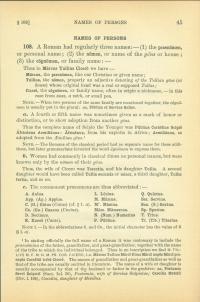108. A Roman had regularly three names (1) the praenōmen, or personal name; (2) the nōmen, or name of the gēns or house; (3) the cōgnōmen, or family name:
Thus in Mārcus Tullius Cicerō we have—
- Mārcus, the praenōmen, like our Christian or given name.
- Tullius, the nōmen, properly an adjective denoting of the Tullian gēns (or house ) whose original head was a real or supposed Tullus.
- Cicerō, the cōgnōmen, or family name, often in origin a nickname, in this case from cicer, a vetch, or small pea.
Note— When two persons of the same family are mentioned together, the cōgnōmen is usually put in the plural: Pūblius et Servius Sullae.
a. A fourth or fifth name was sometimes given as a mark of honor or distinction, or to show adoption from another gēns.
Thus the complete name of Scipio the Younger was Pūblius Cornēlius Scīpiō Āfricānus Aemiliānus: Āfricānus, from his exploits in Africa; Aemiliānus, as adopted from the Æmilian gēns.1
Note— The Romans of the classical period had no separate name for these additions, but later grammarians invented the word āgnōmen to express them.
b. Women had commonly in classical times no personal names, but were known only by the nōmen of their gēns.
Thus, the wife of Cicero was Terentia, and his daughter Tullia. A second daughter would have been called Tullia secunda or minor, a third daughter, Tullia tertia, and so on.
c. The commonest prænomens are thus abbreviated:
| A.— Aulus | L.— Lūcius | Q.— Quīntus |
| App. (Ap.)— Appius | M.— Mārcus | Ser.— Servius |
| C. (G.)— Gāius (Caius) [cf. § 1.a] |
M'.— Mānius | Sex. (S.)— Sextus |
| Cn. (Gn.)— Gnaeus (Cneius) | Mām.— Māmercus | Sp.— Spurius |
| D.— Decimus | N. (Num.)— Numerius | T.— Titus |
| K.— Kaesō (Caeso) | P.— Pūblius | Ti. (Tib.)— Tiberius |
Note— In the abbreviations C. and Cn., the initial character has the value of G (§ 1.a).

